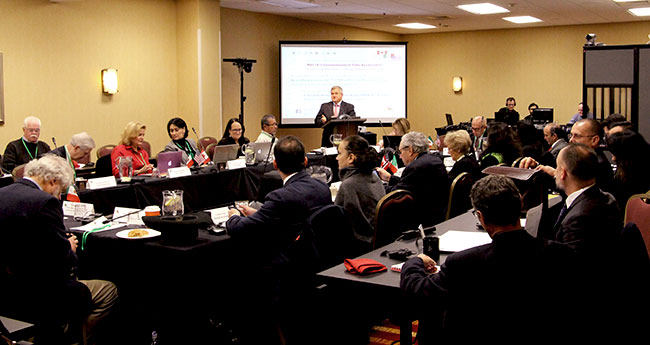CEC’s Joint Public Advisory Committee calls for renewed support for CEC Secretariat
JPAC issues recommendations on the future of NAFTA’s environmental side agreement and the CEC
Montreal, 28 November 2017—The Commission for Environmental Cooperation (CEC) is a unique catalyst for environmental cooperative action at the North American and international levels, the Joint Public Advisory Committee (JPAC) of the CEC heard on 9 November at the committee’s last session of 2017.
“With renegotiation of the North American Free Trade Agreement (NAFTA) underway, it is vital to recognize the importance of the CEC as an institution that fulfills a unique role in promoting cooperation on sustainable development and environmental improvement across North America” said Robert Varney, JPAC chair, who hosted the public meeting in Chicago, Illinois.
The JPAC forum focused on the role of NAFTA’s environmental side agreement—the North American Agreement on Environmental Cooperation (NAAEC)—and the CEC in advancing the North American environmental agenda. Participants who convened in-person and via Facebook live and webcast had the opportunity to exchange with JPAC members and leading experts in trade and environment from government, nongovernmental organizations, and academia.
JPAC is composed of 15 volunteer citizens, five from each country. It advises the Council—cabinet-level environment ministers from Canada, Mexico and the United States—and ensures public participation, openness and transparency in the actions of the CEC.
At the JPAC meeting, experts stressed the need to ensure the longevity of CEC’s body of knowledge and tools, such as publications currently available in the CEC’s Virtual Library, the North American Environmental Atlas, and Taking Stock Online.
Other recommendations stemming from the public forum include:
- Recognize the unique role of the CEC in supporting the North American countries’ global commitments to trade and the environment;
- Include indigenous peoples in discussions related to trade and the environment, and seek new opportunities for engagement of indigenous communities in CEC activities;
- Promote and enhance the capacity of the CEC Secretariat to inform the public on trade and transboundary environmental issues across North America.
More information on JPAC can be found at: www.cec.org/JPAC.

About the CEC
The Commission for Environmental Cooperation (CEC) was established in 1994 by the governments of Canada, Mexico and the United States through the North American Agreement on Environmental Cooperation, a parallel environmental agreement to NAFTA. As of 2020, the CEC is recognized and maintained by the Environmental Cooperation Agreement, in parallel with the new Free Trade Agreement of North America. The CEC brings together a wide range of stakeholders, including the general public, Indigenous people, youth, nongovernmental organizations, academia, and the business sector, to seek solutions to protect North America’s shared environment while supporting sustainable development for the benefit of present and future generations
The CEC is governed and funded equally by the Government of Canada through Environment and Climate Change Canada, the Government of the United States of Mexico through the Secretaría de Medio Ambiente y Recursos Naturales, and the Government of the United States of America through the Environmental Protection Agency.